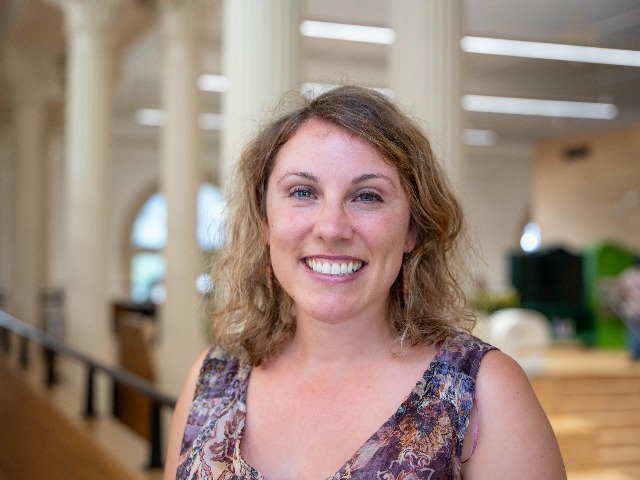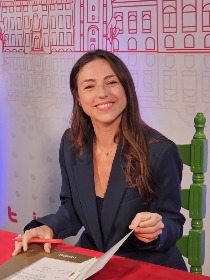Introducing Dr. Élise Rouméas, Programme Director of the BSc Global Responsibility & Leadership
| Date: | 13 December 2023 |
| Author: | Erika Compatangelo |

If you want to get to know more about the bachelor's programme Global Responsibility & Leadership (GRL), the first person you would probably want to talk to is the programme director, Dr. Élise Rouméas. In this blog post, Élise guides us through her academic journey and her role as an educator, and shares his perspective on the programme.
Let's start with the essentials: could you share your academic background and overall expertise?
Recently, I had a bit of an epiphany: it occurred to me that I actually studied at a University College in Paris! Much like our interdisciplinary institution, it provided the freedom to carve out your own academic path. During that time, I delved into social and political sciences, discovering a deep affinity for political philosophy, critical thinking, and abstract concepts. When it came to narrowing down my studies for my master's degree, I specialized in Political Theory, a decision I've never regretted. If I were to sum up political philosophy in a nutshell, I'd say that it is about unpacking political concepts, for example freedom of speech, and making political arguments about them, for example why we should protect freedom of speech in the first place. Reflecting on my journey, I always had a clear vision. I was set on attending Sciences Po, specializing in Political Philosophy, and ultimately pursuing a PhD. My doctoral research centered on the art of compromise, a theme that continues to resonate in my role as a programme director. For me, compromise means equal voice and respect for everyone, as opposed to imposing one's views. Following my PhD, I embarked on a postdoc adventure at Oxford, after which I explored new job opportunities across the continent. The Netherlands, in particular, had something to it that sparked my interest. Perhaps that's due to me perceiving it as a tolerant and welcoming country with high academic standards. My positive intuition led me to Campus Fryslân.
Moving on to your role as an educator, what specific subjects do you teach, and what's the focus of these courses?
This academic year, I'm teaching a course in political philosophy that focuses on political decision-making. It's a two-part exploration, with the first half delving into the ethical dilemmas faced by political leaders, or how leaders sometimes commit some kind of wrong to ultimately do good (the so-called "dirty-hands problem"). The latter half pivots to collective decision-making and strategies to increase citizen influence, including a focus on direct democracy. Designing this course was a fulfilling opportunity for exploration. Last year, I taught a course on Ethics and Global Responsibility, where I covered diverse ethical theories and applied them to contemporary issues such as historical injustice, freedom of speech, and the prison system. The course was dynamic and engaging. Through role-play, students are challenged to argue positions they might not personally endorse.
Let's rewind a bit. What sparked your interest in the realm of political philosophy?
My journey started from the topic of interreligious dialogue, a theme I explored more deeply through my master's thesis and later on with my PhD. However, a pivotal realization hit me midway through my doctoral journey: dialogue thrives when there's no fundamental conflict, typically among liberals and those who are predisposed to moderation. But how do you address conflict in situations that lack these elements? To address this question, I pivoted my PhD focus in my third year. A very unconventional move that, luckily, proved successful for me.
Turning the spotlight on our programme, what would you say sets it apart from others and makes it attractive to students?
In my opinion, what sets our programme apart is that people here dare to experiment with innovative teaching and learning methods. At University College Fryslân, educators are not just allowed but encouraged to think outside X conventional boundaries. I see our institution as an educational innovation hub, where both teachers and students unleash creativity. The intimate setting fosters familiarity among students, empowering them to step out of their comfort zones. I've witnessed amazing political speeches and captivating creative performances from our students. The student community is committed and outspoken, while our lecturers are both experts in their fields and dedicated to the art of teaching and learning. University College Fryslân is really a vibrant space for intellectual engagement and personal growth. Interdisciplinarity and transdisciplinarity are core to the faculty, encouraging students to create value with local stakeholders, whether in Leeuwarden or globally, such as through the Living Lab initiative— research internships conducted by students with external stakeholders. It's an environment where students thrive academically and personally.
Any additional insights you believe would be valuable for prospective students?
Being here truly is an unforgettable experience, largely thanks to the tight-knit community of individuals. Alumni tend to say that it is precisely this sense of community that makes their experience here hard to match. It's a place where rock solid connections are forged, and lifelong friendships are made; something invaluable at any stage of life!
About the author

Ciao! My name is Erika and I am the Content & Data Management Specialist of Campus Fryslân. I was born and raised in Italy and have recently graduated from the MSc in Climate Adaptation Governance. I have been in charge of the blog and all its content since October 2023. My aim is to make this virtual space serve as a logbook for the Campus Fryslân community and as a welcoming introduction for all newcomers. Here, you will find stories from the people of Campus Fryslân to get a taste of what studying here is like and the exciting opportunities it comes with!

